Ellen and Jim Have a Blog, Too
We are two part-time academics. Ellen teaches in the English department and Jim in the IT program at George Mason University.


A Spectacular, Extraordinary film, the 1995 A&E/BBC _Pride and Prejudice_ · 10 June 07
Dear Marianne,
Sometime ago I came to the conclusion I had been dead wrong to be so dismissive of the 1995 P&P and attribute its startling (if only temporary) influence to the sexualized appearances of wholesome heroines, the alluring Colin Firth, and its sheer length. I had been inadequate and too cynical, when I attributed its spell (and that of the 1995 Miramax S&S, BBC Persuasion, and 1996 Meridian Emma and BBC Emma) to brilliant uses of sophisticated computer technology, hiring of charismatic box stars, and huge astute advertising campaigns (I paraphrase a review I wrote). In the case of the 1995 P&P especially (so very long), I had watched it only late at night, and not attentively enough: I had not lent myself to it. I had not spent the time with it that one should—it was as if I skimmed a masterwork rather than sat down and read it in my alert hours.
Some weeks ago I did watch the 1995 P&P more in this way after much reading and viewing of movies for the past few years, lots of reading of film criticism, and (I admit it) with a more open-minded generosity of spirit, a willingness to find in film the depth one finds in novels (as both forms shared scorn for being relatively new); in short, with a better understanding of how to engage with a movie. I came to the conclusion it is one of those films Dudley Andrews describes when he talks of “the fever of an infectious film.” I summarize what I said then: together with the 1995 Miramax Sense and Sensibility, this film created the short-lived Austen mania of the later 1990s. The membership of JASNA grew by leaps and bounds, and sales of anything having Jane Austen’s name on it (e.g., sequels) soared. According to Andrew, such films allow us to relish, cherish, revel in public what we enjoy in secret, and take over the values and experiences we had dreamed as we read the eponymous texts. They challenge reality with their own intensities. How?
“wild shifts in pictorial scale and angle are buckled within an overarching structure, a localizable time and place, and most important, a clear rhetorical schema of motifs and symbols [filmic codes and archetypes]. Primarily these structures provide a dramatic base for brilliant moments of acting, or picturing, but they have an undeniable power all their own …” (Film in the Aura of Art, p. 62)
Well, I’ve been through this film again. I watched it over 3 and 1/2 days using a VLC media player; this allowed me to pause (and take notes); capture stills (so a moment that burns into one’s consciousness without one’s awareness was recorded for later contemplation). I fast forwarded, rewound, and watched scenes over and over again to observe different elements in the mise-en-scene.
I am now persuaded this is the outstanding faithful adaptation of Austen as a film. Qua film this is it thus far. The recent 2007 Persuasion shows what can be done exquisitely in the analogous adaptation way, but it’s too short, not enough is literally there for us to feast upon.
So the question to be answered is, How did they do it? What did Langton, Birstwistle, Conklin, Scott, Davies, Kenway, Davis, Collin, Stewart (director, producer, script editor, design production, screenplay writer, cinematographer, composer, costume designer) and the whole team of actors and everyone else do so right? I say they made an extravaganza of continually inventive and pointed dramatic and enchanced beautiful pictorial tableaux that intense please the eye, ear, mind, heart.
It’s reductive and sneering to attribute the attraction of this film to fetishicizing Colin Firth’s body or alternatively smoldering, yearning, hurt, angry and many-faceted face. He’s an effective actor and handsome, but he was but one element on screen. To be sure many did so attribute the mania to him, and saw a parallel in the development of the male roles in the 1995 Sense and Sensibility, and this has lead to changing the type of actor who is hired to play the Austen hero: we now have macho male Heathcliff rough spy males where hitherto the subtle vulnerable gentleman types were preferred. As there are so many literal readers pop novelists seek to please, so the canny film-maker sees a way to draw in a larger audience. For my part I suggest intelligent perceptive observers who dwell on Firth cannot get themselves to say there is such a thing as a masterwork costume drama.
It’s not that it’s all that faithful either—though literally it gets in many of the famous scenes and dialogues, and often what Davies did was slightly simplify Austen’s language or himself add scenes and lines that feel much in the spirit of the book or ear. In fact (like the 1979 BBC P&P in this), it alters Austen’s point of view. In the case of the 1979 BBC P&P we have a woman-centered film (many of Mr Bennet’s lines are given Charlotte Lucas) which blames Mr Bennet, and concentrates on the last part on Elizabeth’s remorse and shame (though why she should feel remorseful is not yet clear to me). In the case of this 1995 P&P we are concerned far more with Darcy in the second half of the film, and watch him slowly melt, change, come out of his carapace. Austen’s Elizabeth’s long inward self-examination, surprize when she discovers how she underestimated him, and reversal of feeling (shown across the last part of the novel) is omitted from the film. After the initial shock of Darcy’s letter, and her conversation with Jane upon coming home to Longbourne, the film’s Elizabeth basically simply accepts Darcy’s story for true, is open to his shows of love, and silently longing. Not that this obscures Elizabeth from view, for Jennifer Ehle is as continually onscreen as Colin Firth. Very like the slow silent progression of images across the film which trace the growing love of Bingley (Crispin Bonham-Carter) and Jane (Samantha Harker), their separation, Bingley’s absence, and Jane’s deep sense of loss, depression, longing and disillusion (particularly seen in her taut facial reactions to her mother at the end of the movie), to renewal of hope, and love, so the overt images the camera catches between them in reverie, actual scene, through voice overs accompanied by switching back and forth of the camera from his face to hers, keep her before us as much as they keep him. Bingley and Jane are made genuinely the secondary couple, and Elizabeth is in the second part of the film secondary to Darcy.
Davies made Lydia particularly mean to Mary; he turned the mother into an uncontrollable dense grating presence; he made Mr Bennet more sentimental. What he can do (and expertly) is add dialogue that sounds very 18th century that brings modern attitudes to bear on the film, and that replaces more believable acceptable sentiments where Austen had stilted or not quite persuasive lines. Would Darcy have said to Elizabeth “By you, I was properly humbled”? It rings false. In lieu of this Davies writes lines which come from a man who for once was made to flinch in the core of his being by how he was made to see he was acting in front of someone else who he had not been considering as a person with depths and feelings equal to, just like, his own. Davies can also simplify somewhat while keeping the actual words or spirit or (equally often) changing or somewhat softening (sentimentalizing or reversing) the spirit or implications (in Austen often austere, dry) of a series of famous lines.
It’s what seeming faithful allowed the film-makers to do. (We should never ignore the obvious.) What they did right was to be lavish, to spare nothing. From costumes and production design, to stage management and flashbacks, voice-overs, close-ups, tracking shots, the camera work is excessive, obsessive, feverish with creativity; there is a continual unashamed use of repeating archetypal phallic, feminine, archetypal images which (through repetition, parallelism and contrast, sheer pictures) force more and more out of each turn of the story. It’s that seeming faithful allows the film-makers continually to add hundreds of shots in many scenes not in the book at all, so a strong independent creation of images is constantly rolling before our eyes with much sensory manipulation, emotional depth and psychological pointing.
And they are willing to spend time. When after Elizabeth has played “Voi che sapete” (from Mozart’s Don Giovanni) before Darcy and the Bingley clan at Pemberley, and then so generously protected Georgiana from the spite of Miss Bingley (admittedly aimed at her), and all have left the room, we follow Darcy in the dark walk slowly down the magnificent corridor of his house, move into a room with a gorgeous fireplace, turn to stare at the piano and remember. It’s a series of at least 6 shots all done in what feels like the real time it would take for Darcy to relive the evening. There are other such tracking shots.
The 1995 P&P takes Austen’s book as a recipe, an outline, goes well beyond it to reach us with a primacy of vividly felt pictures, and well thought out acting and gestures from the smallest to the largest.
I here list just a few of the cornucopia of beautiful and effective shots and continual throwing out of dramatic moments I’m talking about.
Elizabeth quietly walking, time and time again revelling in the sounds, colors, air, smell of the open fields;
Enough extra beautiful landscapes to create a feeling of a superabundance of beauty night and day, including wild revelling outside the Netherfield Ball, and crowded hard poverty in London streets;
The opening sequence of men coming on horses to rent and Elizabeth gazing over countryside (Episode 1); very phallic, with Elizabeth on top of the hill gazing down at the house and men;
At Netherfeld: the scene of Jane with Miss Bingley and Mrs Hurst at table; the men out shooting (guns very phallic) and caming back in the evening; Elizabeth coming downstairs from Jane’s room, enters billiard room, confronts Darcy and he her, silence, she exits, and he hits that red billiard ball hard; he takes a bath in the tub (a motif Davies repeats in his 2007 Northanger Abbey only there it’s Catherine Morland, the heroine who is seen naked from the back); through the window (a woman’s stance sually) he watches Elizabeth running and frolicking with the dog. All this is just Episode 1
More briefly: Darcy’s intense walk back after he is rejected, and his active writing that letter, intense release and many flashbacks with the camera going back and forth from hm to her as they rehear the words the other said to each; Elizabeth approaching the peake:
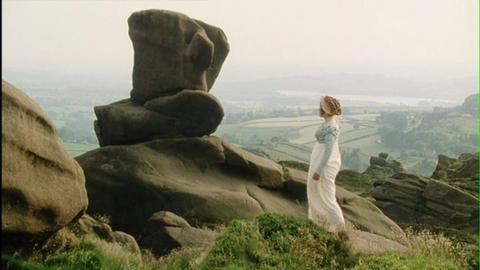
Elizabeth beginning to apprehend what’s about her:
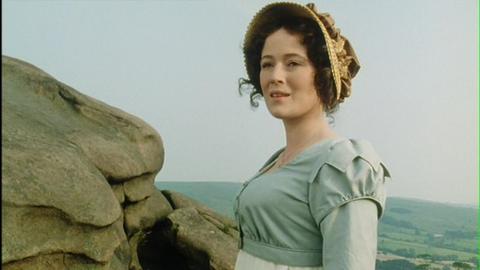
We with her, we looking down over her shoulder to the vast landscape below:
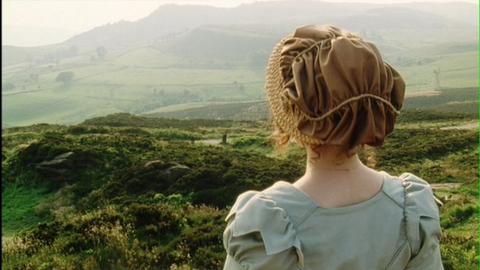
And then down to Mr and Mrs Gardener and the driver of the carriage below:
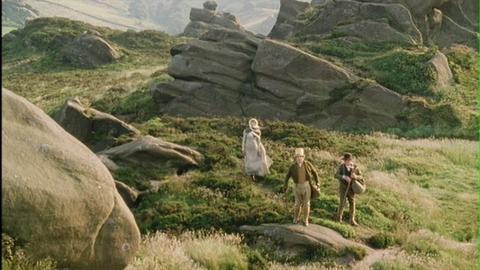
This after the contented interchange of smiles and talk between Elizabeth and the Gardeners (close-ups) as they ride along.
Then Darcy fencing alternating with Elizabeth in carriage with the Gardeners; Darcy swimming, plunging deep in. As Elizabeth had charged (run) through the woods after she rejected him and we watched him write the letter, so she comes upon him; he walks intensely back to the house after swimming. And these are fleeting moments in added in Episode 4.
Wonderful story suggested in a few second pantomime: 4 shots of Darcy questioning and paying prostitute on the way to Wickham. This made me remember the kindness of Burgo Fitzgerald to a street-walked in Trollope’s Can You Forgive Her, and the Palllisers films even more:
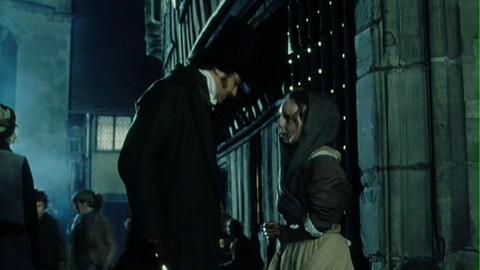
Darcy seeking Lydia, stops to talk to a woman living on the streets
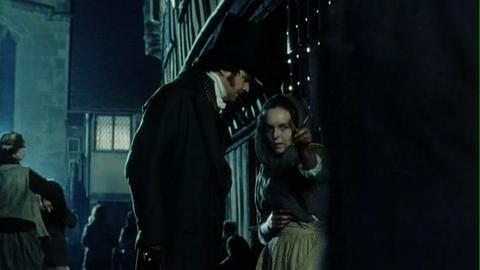
The woman knows where Wickham is
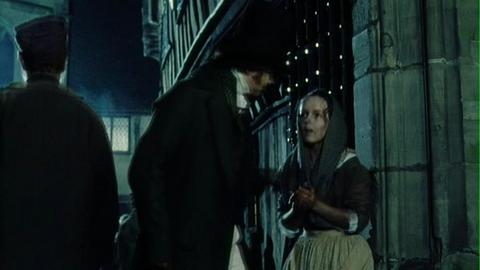
Darcy gives her far more money than she expects and asks nothing more
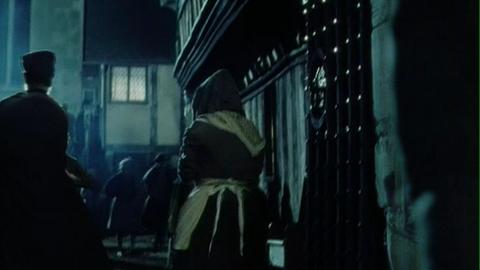
She scurries off with this unusually generous amount
This could have been Lydia in a few years. Sheer luck keeps the Bennet girls from knowing of these places. We feel Darcy would never have left Georgiana here—but who knows where she would have run from him first. The whole thing passes before our eyes in well under a minute.
The three scenes of Wickham and Lydia in their rented bedrooms. Episode 5 and 6.
Showing it’s not all Darcy: a set of 5 shots for an interlude post-Lydia’s marriage of Jane & Elizabeth walking & talking, Mary playing piano, Kitty hat-mending, Mrs Bennet bothering others, Mr Bennet reading, and Elizabeth before the mirror in the evening (Episode 6).
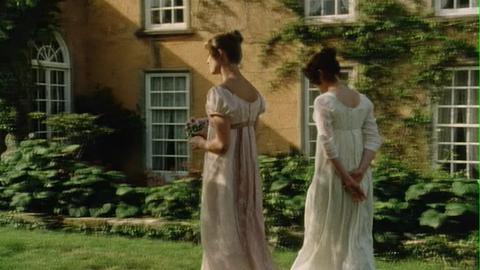
Elizabeth and Jane stroll and talk
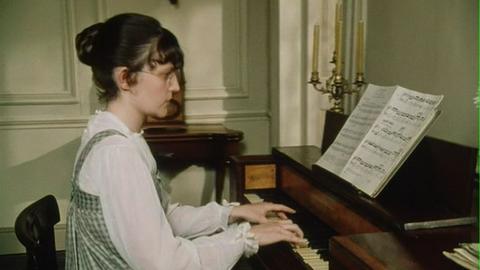
Mary practicing, practicing
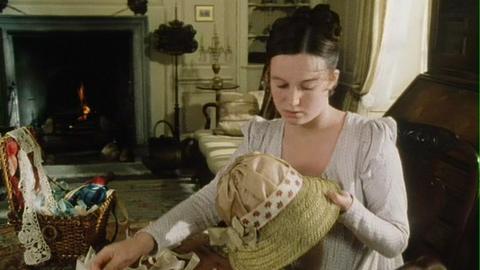
Kitty tries to improve her hat
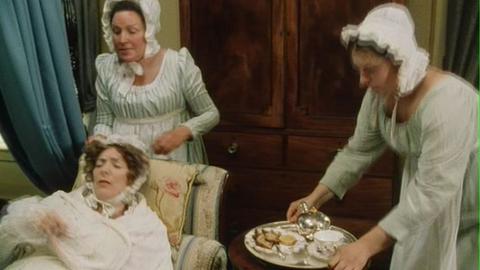
Mrs Bennet making a nuisance of herself, a bother to others as she has nothing within her to occupy her
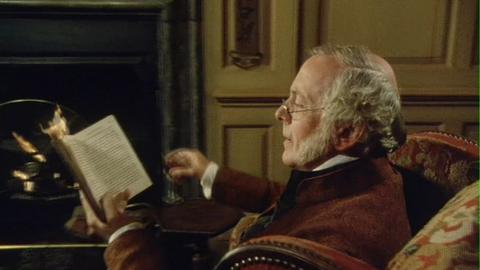
Mr Bennet enjoying his book, wine
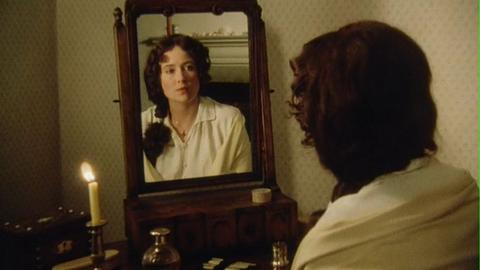
In the novel it’s time passes.
I cannot convey the sheer inventiveness, the denseness of the daydreams, the use of ritual imagery and movement (from dancing to carriages, packing and unpacking, smoke seen from the chimneys when Bingley returns). How does one catalogue all the luxuries, and how the camera brings so many things into relationships, tells so many large and small stories. There is too much to read, too much to take in.
The film may stun you so that you begin to pull back and refuse to respond to the manipulation.
Having said this it feels currish to complain and say I don’t quite warm to an inner life. I find something missing after all. I feel that Davies has not interpreted the book to project a meaning that reshapes Austen’s book to speak to the experience of life in our time (as for example I feel the 1972 BBC Emma and the 1983 Mansfield Park do) beyond simply being this artful masculinist costume drama.
Well, people say a poem need not mean; it need only be. This movie is a vast romance poem. I don’t praise the film because it’s faithful to the book or is a substitute for it; it’s quite different and what I value it for is in itself and I still think the earlier (1979) P&P has strong merits. It’s qua film that this one wins out.
Elinor
--
Posted by: Ellen
* * *
Comment
- From Luca Gandolphi:
“One of the scenes that I love best in P&P ‘95 is at the beginning, when Lizzie from the hill watches Darcy and Bingley ryding. There’s something “archetypal” in it: it reminds me similar scenes in western movies, where an indian watches the “white man” passing in a far distance or, in Star Wars, when nomad inhabitant of planet Tatooine watches the imperial starship passing in the sky.
IMHO, is a sort of parody of this classical way to opening a movie, related to the previous words said by Darcy, that (in translation) sound: ‘Here, you’ll find only savages’.
By the way: do you know if it is possible to know, in some way, which book is Mr. Bennet reading?
Cheers,
Luca”
— Elinor Jun 11, 6:47am # - From Sam Cahill:
“Ellen,
I agree that the 1995 A&E P&P is truly remarkable and likewise wonder what accounts for it. I think perhaps it’s because the producers took Austen on her own terms and conveyed that the way she presented her material had relevance, it didn’t need to be excessively modernized. The social constraints women and men had to negotiate in Austen’s time are not the same for us, but the individuals she portrays are nevertheless relevant to us as test cases of human behavior under
pressure.
I do find it interesting that both Colin Firth and Julia Sawalha were cast somewhat against their professional niches. Firth had appeared in Valmont only a few years before P&P and Sawalha played Saffy on Absolutely Fabulous. Both are about as far away from their characters in P&P as you can get.
I’m interested in what the list thinks of the A&E The Last King about Charles II. Specifically, the initial focus on Castlemaine and then the viewer sharing the perspective of Catharine of Braganza when she’s first introduced. I’m not sure what I think of it, but then I’ve never come across a movie about the Restoration that I was particularly happy with.
Sam"
— Elinor Jun 11, 7:37am # - Dear Luca,
I’ll lay a bet the film-makers did have Whitlow read a specific book—many of these film-makers do choose a specific book for their actor to be reading. And I’ll bet it’s recorded which one somewhere.
But we’d have to go to the BBC library where they keep the screenplay and many other materials and begin our hunt there.
The scene you like reminds me of so many 18th century novels to today (beginning with Emily in Radcliffe) where the heroine gazes out from a point high on a hill over a landscape, contemplative. An interesting aspect of this 1995 A&E/BBC P&P is very unusually we have men gazing out windows; in most of these films, the women do, and the men are all outside. While the men here are clearly outside (with the shooting guns seen graphically even over-the-top phallic), we repeatedly also see Darcy gazing out a window and the point is made that Wickham doesn’t lest his creditors see him. When not in uniform or protected by connections, he hides away in a dark corner with his bottle and hopeless accounts, trying to keep Lydia from the window (the parallel is Mr Bennet looking over his accounts though in a nicely appointed library).
E.M.
— Elinor Jun 11, 9:02am # - Dear Sam,
I don’t know much about Julia Sawalha; in the film Lydia is made into a superfluously cruel, dense and insensitive person; she never misses a chance to sneer at Mary; she is spiteful to Kitty; her idea of happiness is to think others envy her (any others) and she is triumphing over them. I felt sorry for the actress with that awful bra making her breasts seem like they were ever about to fall out of her dress. To me the dress stigmatized her, and I back that up with how Isabella Tilney was similarly trussed up in the recent 2007 Northanger Abbey.
Firth seemed to me to be chosen precisely because he often plays a noble sort of man, wounded within, sensitive but also very manly (as in A Month in the Country and Girl with the Golden Earring, a wounded emotionally distraught veteran in the first and Vermeer in the second). Adrian Lukis (as Wickham) also seems a man who could play that type, and he looks hurt and isolated in his last scene with Elizabeth when she informs him she knows he willingly gave up his place as a clergyman for a sum of money from Darcy, which sum he then went through quickly. He’s a loser, one of the bad losers of the film for he is given a presence which seems to have some intelligence and insight. Sawalha is made as materialistic and stupid as Mrs Bennet (Alison Steadman).
E.M.
— Elinor Jun 11, 9:06am # - "Ellen,
I’ve just read your blog on the 1995 Pride and Prejudice. I think it’s excellent. Your careful attention to what makes this series great exemplifies the kind of criticism of an adaptation that I try to show my students.
I have one small correction to tell you about, though: “Voi che sapete” is from Mozart’s Marriage of Figaro, not Don Giovanni.
In the opera, it’s sung by Cherubino to the Contessa and Suzanna. It’s a plea from a the inexperienced youth to the older and more experienced women to tell him what love is. Elizabeth’s singing it (with English words) in the presence of Georgiana Darcy somewhat mirrors the situation in the opera.
Best wishes,
John O’Neill"
— Elinor Jun 11, 10:24am # - Dear John,
Thank you very much for the correction, and the praise too. I had begun a project which was originally to produce a long article for a collection on film adaptations of 19th century novels. I know Austen is mostly considered an 18th century or regency novelist (or part of the romantic era), but the editor specifically asked me if I would contribute and it was a much easier job to begin with Austen than Trollope, on whom nothing has been written in this way and who will be my next candidate—an open field! However, my work is growing and I was unable to produce the article by this month so if she’s not able to wait for me, I’m going on perhaps for a monograph or book.
So my blogs are just chock-a-block with me working out my thoughts—not yet on Trollope as I feel I have to finish all 26 episodes of the Pallisers before I can think of putting something on the blog. Meanwhile I have reams of notes on the Palliser films.
Today I’m going to work out another thing I’ve noticed in the 1995 BBC/A&E P&P: the many series of interludes and original scenes are put in places after an Austen chapter has ended and another not yet begun. I notice that the literalists complain that in the 2007 Persuasion the enunciation (the way the dramatic events are worked out) differ from the novel: Anne Elliot runs hysterically releasing herself at long last through Bath. This happens twice in the 1995 P&P but not in places where there is a scene in P&P; rather in places between scenes.
Two, in Austen’s P&P there is not one dialogue between Bingley and Jane. Not one. What to do? These 1995 P&P film-makers have arranged the stage management of many scenes and quietly added a scene here or there (like in the garden between Elizabeth and Jane and then Elizabeth and her mother where Jane is deeply unhappy with the loss of Bingley) and then again in the end emphasized silently the return of Bingley and then added one scene of Bingley angry at Darcy for lying to him, Darcy all apologetic (Austen did not make Darcy’s reform all that believable, but the film-makers are determined to make it so) and then stage management again so that we have a secondary silent story of Jane and Bingley through sheer stills. No one complains because no one is offended but they have changed the emphasis of Austen a lot here to have a story where a woman cannot exist because she fell in love at first sight.
Then I’m going gack to the 1979 BBC P&P (Fay Weldon's) because I want to see why I like it so much and perhaps more than the 1995. Or do I? If so, what is in the 1979 BBC P&P I prefer? The emphasis on Elizabeth? But Weldon presents Elizabeth as as intensely remorseful and guilty in the last part of the film. My hunch is what I'm going to discover is the 1995 film is a movie about Darcy, Darcy's inner change, in short a male romance; and that the 1979 film is a movie about Elizabeth's inner life.
I cannot convey how much pleasure I'm getting from all this.
E.M.
— Elinor Jun 12, 8:16am # - People write me offblog:
“I happened to stumble upon your recent analysis of the BBC 1995 production of Pride and Prejudice, and I really enjoyed it very much!
I love Colin Firth as much as the next woman (well, maybe a bit more than the next woman!), but you really nailed what makes the adaptation work, Colin’s smoldering notwithstanding. It’s 5 plus hours of television I have watched many times over, and reading your comments made me want to watch it again.
Thanks!
Mrs Mish”
— Elinor Jun 25, 2:16pm # - From Joan Wall:
“I got to reread Joseph Andrews for my local book club and loved it again. I watched an old movie of it this afternoon that is just awful. But I also watched the P&P that you wrote about on line and just loved it. I really felt like this was Austen speaking. We have it downstairs in out tape library so I’ll be watching it again soon.
Joan”
— Elinor Jun 25, 2:18pm #
commenting closed for this article
